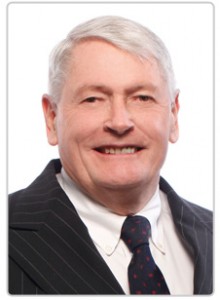
After more than 40 years of operation, DTVE is closing its doors and our website will no longer be updated daily. Thank you for all of your support.
Malone on Starz: international expansion and distribution partnerships will be key
Lionsgate’s acquisition of Starz creates a new opportunity to strengthen the business, expand internationally to compete with global premium players like Netflix and to develop a business model based on closer integration with distribution platforms such as Liberty Global, according to Liberty Global chairman John Malone, who held the majority stake in Starz.
Speaking on stage with Lionsgate Investor Gordy Crawford of Capital Research and Management at Lionsgate’s investor event this week, Malone compared traditional standalone content companies to arms dealers selling equipment to warring distribution platforms, and argued this model had to change to secure the future of the business.
“The question for Lionsgate is how far up the food chain you can go. Can you create a Netflix-like direct-to-consumer proposition? That is a great model if you can get the content. If you can’t quite get there perhaps you can have a distribution asset that is part of a wider distribution package,” said Malone. “If you are just a factory manufacturing and selling AK-47s to the warring nations, how much wealth and margin do you create and how value does your library have?”
Malone said that the acquisition of Starz would create a strong revenue and cash-flow for Lionsgate, meaning that it could leverage its equity to a greater degree by limiting the volatility associated with the movie business. He said the merger of Starz and Lionsgate would help provide a feed of content to the former, enabling it to compete into the future.
However, he said, the growth in demand for à la carte consumption and non-linear viewing and the Netflix model meant that the traditional carriage model had to change, with a closer partnership with distributors such as Liberty Global pointing the way ahead.
Malone said that premium services like Starz and HBO traditionally had only been available via “the big [basic] package”, and that model was still holding to a large extent. However, he said, this would likely change. “Distributors will wake up and as people cut the cord from the big bundle they will offer premiums as part of the connectivity package rather than through the big bundle,” he said. He said that “even Reed Hastings sees the benefit of being in a package” and had approached the big operators in the US and internationally about a revenue split in exchange for having Netflix content “inside the fence”, accessible on advanced set-top boxes and integrated into the operator billing system.
International growth would be the other key to Lionsgate and Starz’s growth, said Malone.
He said that Starz had never been properly distributed internationally. “One of the reasons I thought it was so important to bring both Discovery and Liberty Global on the Lionsgate board was to exploit that international opportunity to take the skill set that Lionsgate has and some of the assets it has, and exploit them on a more international basis. They can already sell syndicate [content] but what I’m talking about is a continuity brand identity and maybe even valuable distribution assets on a more global basis,” he said.
Malone said that it was not possible to build a truly competitive media business without an international dimension. He said Lionsgate was now in a good position to develop via acquisition or organically.
Turning to the evolution of distribution platforms themselves, Malone said that bringing fixed and wireless platforms together was key, and hinted at prospects for further cable consolidation in the US as well as the possibility of cable operators acting together to acquire T-Mobile.
Malone said that Liberty Global in Europe offered a wireless component in every market it is in. He said that the best example of what the company was trying to do was the VodafoneZiggo combination in the Netherlands. Malone said the deal would enable true convergence between fixed and mobile. He also cited Liberty’s Telenet in Belgium, which has gone wireless on its own by the acquisition of BASE Company.
Malone said the US was now looking more like an exception with “a complete separation of services”, thanks to the dominance in wireless of Verizon and AT&T. Malone said that the three major cable companies in the US could get together and buy T-Mobile. He contrasted the ubiquity of wireless with the territorial specificity of cable, and said that cable operators would have to “gang together” to provide a national wireless service.
“I have spent my career trying to consolidate the US cable business and it’s a question politically,” said Malone. He speculated that with the incoming Trump administration’s different approach, there was a possibility that “maybe Comcast and Charter could merge”.



